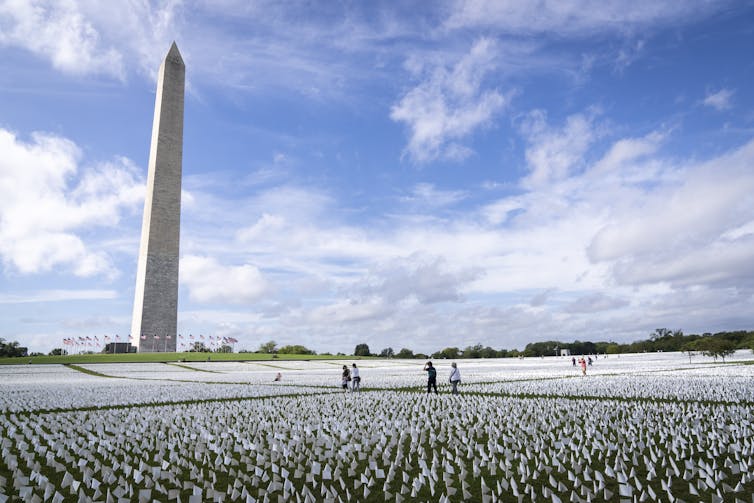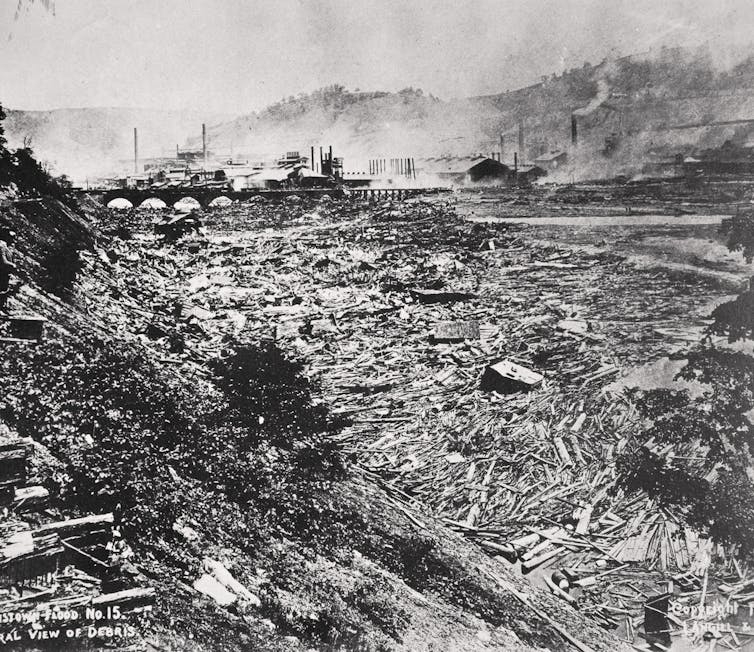Tragedy seldom unifies Americans today.
Every year, horrific crises induce tremendous suffering. Most are privately tragic, affecting only those directly harmed and their immediate relations.
A small number, though, become politically notorious and, therefore, publicly tragic.
Natural disasters, school shootings, terrorist attacks and economic crises can become public tragedies. Sexual assaults – primarily of women – by abusive executives and other men in positions of power recently emerged as a public tragedy, as has police brutality against African Americans, which has sown political unrest across the United States.
Even the COVID-19 pandemic, a seemingly natural disaster, quickly transitioned into a public tragedy as deaths mounted and a pervasive sense of mismanagement, distrust and blame galvanized the public on the political left and right.
Events like these represent a change in how tragic circumstances are cast and how they are responded to in the United States and beyond. Public tragedies are heartrending events that gain widespread public attention. They involve stylized public expressions of shock, outrage, social blame, claims of victimization, protest and memorialization.
My book, “After Tragedy Strikes,” explores the recent proliferation of public tragedies as a distinctive kind of political crisis that has produced far-reaching positive and negative effects on social and political relations in the 21st century.
As a sociologist who studies risk, politics and social movements, I didn’t set out to evaluate the authenticity of claims made in public tragedies. Rather, through comparison, my goal was to understand better why some of these events exert tremendous influence, while other, objectively similar, traumas do not.
Public tragedies have contributed to the increasing political polarization and the sectarian tone of political rhetoric today. One question I sought to answer in my book is why?

Old way: ‘God, fate, bad luck’
The short answer is that the public’s understanding of tragic events has changed.
Well into the 20th century, tragedies were mostly explained differently than now. Explanations often referenced forces such as God, fate, bad luck, blameless accidents or, in line with the U.S. liberal political tradition, individual responsibility. Even when suffering was extreme and known to have been caused or worsened by the actions or omissions of other persons, explanations of what caused it typically took these forms.
Take Pennsylvania’s Johnstown Flood of 1889, in which more than 2,200 people and much of the city were swept away by a deluge after a dam failed. The wealthy South Fork Fishing and Hunting Club had built the dam to create a private lake. Despite the failure due to poor construction and maintenance, neither the club nor its wealthy members would be held responsible. In the most prominent legal case brought against the club, the final verdict attributed the tragic deaths and destruction to an act of God.
Today, this explanation would be indefensible.
New way: ‘government, industry, culture’
After a tragedy, accounts now focus on assigning blame. I found that they also typically center on social blame, in which societal institutions such as the government, industry, civil society and even American culture are held responsible.
Social blame attributes harm to social forces, not individuals or God. And because some group or aspect of society is blamed, public tragedies involve political conflict.
Another reason public tragedies have become so politically consequential lies in a change in the contemporary American mindset.
Polls show that many Americans are experiencing fear and a deep sense of vulnerability to circumstances that feel beyond their control.
This mindset inspires sympathy for victims of tragic circumstance, especially when the harms they suffer are portrayed by political elites, the media and social activists as reflecting political failure and an unfair society. Political interests on both the left and right now routinely use claims of victimization to gain support and advantage.
George Floyd’s murder: A public tragedy
Take the story of George Floyd, killed in 2020 by Minneapolis police officer Derek Chauvin.
Floyd’s murder provoked nationwide outrage as video footage of it circulated first on social media and then through sustained news media coverage. The news and social media story of Floyd’s death emphasized his innocence: As a Black man, he had suffered an unjustified death at the hands of the police.
This representation was unusual at the time. Standard coverage of such killings often focused on resistance to arrest, prior indiscretions or the victim’s criminal record, which implies individual responsibility. Stories regarding Floyd’s death did not emphasize these elements.
Nor did the stories suggest Floyd’s death was a necessary part of police fighting crime – another common feature of news accounts. Nor did stories emphasize that Chauvin was a rogue cop, which would have suggested his killing of Floyd was his responsibility alone.
Rather, the initial stories connected Floyd’s killing to police violence across the country, suggesting it was a common police behavior.
Thus, Floyd’s murder was quickly blamed on “policing,” gaining enormous public sympathy and notoriety – and, with this, political significance. It became a public tragedy, highlighting a set of societal conditions surrounding Floyd’s death in a way that few police killings of Black men had achieved.

‘Good people brought low’
In the past, Americans might have attributed Floyd’s killing to fate, bad luck, accident or his individual responsibility, which might have weakened public outrage.
Yet explanations of this kind are not as believable as they once were. Instead, the heartrending stories characteristic of public tragedies follow a routine storyline I call the “trauma script.” It is a stylized rendering that taps into American fears and vulnerabilities and prompts emotional response and moral panic.
The script centers on innocent victims harmed by unforeseeable, uncontrollable and unwarranted circumstances blamed on the actions or omissions of “society.”
In this telling, public tragedies convey a moral struggle in which good people are brought low by a bad society. This tragic struggle is not internal and personal but external and socially focused. It’s a scenario in which bad things happen to good people who have no choice.
The public perception of trauma and loss and its underlying causes has, therefore, changed over time.
In an earlier era, Americans often justified hardship because it reflected the sacrifice necessary to get ahead. Now, a shift in sentiment reflects a change in view. Americans now focus on unjustified hardship caused by society. This reflects a cultural shift from a progress-centered worldview toward a risk-focused one.
Victimhood as a political identity
As Americans have become more aware of risks, they increasingly view them as reflecting political choices.
Whether the issue is climate change, energy sources, guns, sexual harassment, discrimination, policing, abortion or even free speech, these are now understood as involving decisions regarding risks that will benefit some and victimize others.
Politically, these have become zero-sum disputes, leading to political polarization among Americans and social distrust of American institutions.
Recent Pew surveys show that two-thirds of Americans believe other Americans have little or no confidence in the government or other citizens. Gallup, too, has shown that American confidence in the government and other major societal institutions has fallen to historic lows.
Growing American distrust of their fellow citizens and perception of an unfair government have also intensified political competition. Americans increasingly blame their political rivals for their hardships and show compassion only toward those who share their beliefs. This shift has also cultivated sympathy for claims of societal victimization and elevated victimhood as a political identity.
These conditions are the context within which public tragedies, as polarizing not unifying political events, have proliferated.

